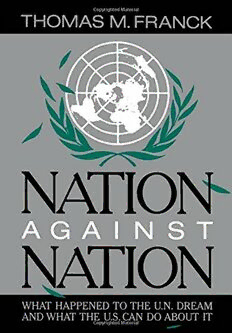
Nation Against Nation: What Happened to the U.N. Dream and What the U.S. Can Do About It PDF
Preview Nation Against Nation: What Happened to the U.N. Dream and What the U.S. Can Do About It
Nation Against Nation This page intentionally left blank Nation Against Nation WHAT HAPPENED TO THE U.N. DREAM AND WHAT THE U.S. CAN DO ABOUT IT Thomas M. Franck New York Oxford OXFORD UNIVERSITY PRESS 1985 Oxford University Press Oxford London New York Toronto Delhi Bombay Calcutta Madras Karachi Kuala Lumpur Singapore Hong Kong Tokyo Nairobi Dar es Salaam Cape Town Melbourne Auckland and associated companies in Beirut Berlin Ibadan Mexico City Nicosia Copyright © 1985 by Oxford University Press, Inc. Published by Oxford University Press, Inc., 200 Madison Avenue, New York, New York 10016 All rights reserved. No part of this publication may be reproduced, stored in a retrieval system, or transmitted, in any form or by any means, electronic, mechanical, photocopying, recording, or otherwise, without the prior permission of Oxford University Press. Library of Congress Cataloging in Publication Data Franck, Thomas M. Nation against nation. Bibliography: p. Includes index. 1. United Nations. 2. United Nations—United States. I. Title. JX1977.F694 1985 341.23 84-25393 ISBN 0-19-503587-9 Printing (last digit): 9876543 Printed in the United States of America To SHEILA BIDDLE "better lo'ed ye canna be" This page intentionally left blank Acknowledgments Ecclesiastes tells us (xii, 1): "Of making many books there is no end; and much study is a weariness of the flesh." This is a fair description of the scholar's lot, particularly in the halls of aca- deme. Yet, this book has been a joy to write, despite the fact that it expresses some decent measure of anguish and anger at the failure of the U.N. dream. The joy was due to the conditions under which this book was written. The Guggenheim Foundation's grant, a sabbatical leave granted by the N.Y.U. Law School and sabbatical stipend supplemented by the N.Y.U. Law Center Foundation facilitated an extraordinary and, indeed, for me unprecedented luxury: sixteen continuous months of undisturbed concentration on one sub- ject. At the U.N., where I had previously worked, concentration comes in 40-second modules, monitored by the hyperactive telephone. The opportunity to pursue tangled skeins of logic, following threads of ideas wherever they might lead, is the scholar's and teacher's delight and I am grateful for its wonderfully recuperative effect. I am also grateful to the N.Y.U. Center for International Studies for organiz- ing meetings with informed critics while the manuscript was at the draft stage. The Center also funded research assistance through its Junior Fellows program. Particularly helpful were Dean Norman Redlich and Associate Dean John L. Peschel in scheduling my classes, on my return to teaching, so as to facilitate long weekends in which to complete my writing and, otherwise, running inter- ference when administrative and other chores threatened to nibble to death the scholarly urge. An important reason for my joy in the writing of this book was the quality of personal support from those who worked with me. My assistant, Mrs. Rochelle viii Nation Against Nation Fenchel, did not merely type this manuscript, repeatedly and with great care, but made many important suggestions while performing invaluable editorial functions. Her interest in, and enthusiasm for, this project was a stimulus and constant reminder of the high aspirations with which we had embarked on it. Five Junior Fellows not only did historic and bibliographic research but actively participated in interviewing numerous sources in New York, Washing- ton, Geneva, and elsewhere. All of them, a most unusual group of young lawyers—Robert C. Treuhold, Margaret N. O'Malley, Jerome M. Lehrman, Troy Alexander, and Kevin W. Quigley—constantly stimulated me with per- ceptive but unobtrusive suggestions and criticisms. A substantial number of diplomats, scholars, and U.N. officials have read parts of this manuscript. Herbert Reis, the redoubtable lawyer and conscience of the U.S. delegation to the U.N. for thirteen years, took the time to make important suggestions throughout. Assistant Secretary-General George L. Sherry read several chapters, as did my friends and former ambassadors to the U.N., Theodor Meron and Tommy Koh. Judith Friedlaender read the entire manuscript with great sensitivity. I am deeply grateful to them and to many others it seems best to leave unmentioned. They are not responsible, of course, either for my mistakes of fact or for my personal deductions and conclusions; but their unstinting and solicitous encouragement did measurably improve the quality of my work, as also the ethos in which it was performed. This is my fourth book for Oxford University Press, which speaks eloquently of the high regard I have for my editors, Leona Capeless and Sheldon Meyer. New York T.M.F. December 1984 Contents Introduction 3 1 Great Expectations 6 2 Happy and Misleading Auguries 25 3 Et Tu, Nehru 45 4 "A Rather Good Document" 59 5 The End of Innocence 76 6 His Sisters and His Cousins and His Aunts: The United Nations Civil Service 94 7 The Secretary-General Invents Himself 117 8 Filling the Void: Action by the Secretary-General in the Face of Inaction by Everyone Else 134 9 Unfulfilled by Unifil: The Security Council in Search of a Role 161 10 The General Assembly and the U.S. National Interest 184 11 "A Place Where Lies Are Told": Israel Before the General Assembly 205 12 The Double Standard 224 13 Playing Hard-Ball 246 Conclusion 270 Notes 273 Index 317
